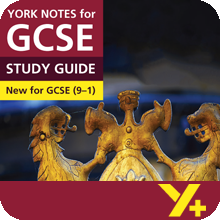Examiner's Notes
You assessed this answer as Grades 8–9.
Hover over the highlighted text to read the examiner’s comments.
Question: Read from Act I Scene 3 ‘Marry, that “marry” is the very theme/I came to talk of’ (line 44) to ‘Go, girl, seek happy nights to happy days’ (line 85). At this point in the play, Lady Capulet talks with her daughter about the prospect of marriage.
Starting with this conversation, explore how Shakespeare presents parents and children.
Write about:
- how Shakespeare presents Lady Capulet and Juliet’s relationship in this conversation
- how Shakespeare presents parents and children in the play as a whole.
In the passage, Shakespeare presents Lady Capulet as quite cold in her dealings with Juliet, rather than maternal. Though discussing a sensitive subject, Juliet’s potential marriage, she is blunt and businesslike, for example ‘Tell me, daughter Juliet, / How stands your disposition to be married?’ Her cold approach also extends to the Nurse and she is irritated by the Nurse’s constant interruptions and enthusiasm such as, ‘A man, young lady! Lady, such a man . . .’ This helps us to see a contrast between the Nurse, who has taken care of Juliet in a motherly way since birth, and Juliet’s actual mother who seems more distant.
As a modern audience, we might feel that Juliet is too young for marriage, but in the context of the play, it was very common for girls to marry at this age. Lady Capulet tells us, ‘Here in Verona, ladies of esteem, Are made already mothers.’ We find out that Lady Capulet married Capulet and gave birth to Juliet herself, at much the same age, revealing: ‘I was your mother much upon these years’, though it seems that any real care for Juliet has been done by the nurse, who is full of anecdotes about Juliet as a child. This suggests that parents in wealthy households may have had little actual contact with their children.
Lady Capulet tries to show Paris in a good light, however, it is crucial to remember, she is advising Juliet to look favourably upon a man who is a complete stranger to her, with the intention of marrying him, asking ‘. . . can you love the gentleman?’ Lady Capulet’s language focuses on his looks or his money: ‘beauty’s pen’, ‘fair volume’, and the phrases ‘all that he doth possess,’ all suggest that wealthy parents were keen to extend the power and wealth of their families through marriage, rather than encourage marriage for love.
However, this does not seem to be the case when we think about Lady Montague at the beginning of the play. In contrast to Lady Capulet, she seems like a caring parent who shows her concern for Romeo by saying:, ‘Right glad I am he was not at this fray.’ His father too, seems sensitive to Romeo’s unhappiness, asking Benvolio: ‘Could we but learn from whence his sorrows grow,/We would as willingly give cure . . .’ suggesting the Montague parents may well have been supportive of Romeo, if he had confided in them and not the Friar.
Lord Capulet seems more caring and protective than Lady Capulet when Paris comes to ask him for her hand in marriage, reminding Paris that Juliet is his only daughter and that an early marriage might bring risks of death in childbirth, when he says: ‘ too soon marred are those so early made.’ However, Capulet changes his mind rapidly and not only agrees to the wedding, but arranges it swiftly without Juliet’s consent or agreement. He assumes that because he is Juliet’s parent, she will do precisely as he bids, telling Paris: ‘I think she will be ruled/In all respects by me; nay more, I doubt it not.’
Capulet uses aggressive, insulting and threatening terms such as: ‘Hang thee young baggage, disobedient wretch! . . . My fingers itch.’ when he feels Juliet is going to disobey him. This suggests his own pride and reputation is at stake, if he has to cancel the wedding plans. Clearly, the fact he has agreed to the marriage with Paris, means it must go ahead almost like a business contract. It suggests to us that these values were more significant than for a father to consider what his daughter really wants.
However, in the context of the play, an aristocratic woman, at this time, would not have her own income or lands if a male relative were alive. All wealth would be passed through male heirs in this patriarchal society. Though his attitude seems appalling, Capulet is only trying to ensure his daughter has a secure future where she will be well provided for.
Towards the end of the play Juliet’s parents seem absolutely devastated when the Nurse discovers her ‘death’. Capulet cries out: ‘But one, poor one and loving child . . . And cruel Death hath catched it from my sight!’ However, the real loss of both of these only children acts as a punishment for the feuding Capulet and Montague families, suggesting they both had a lot to learn as parents from the love their children had for each other.
